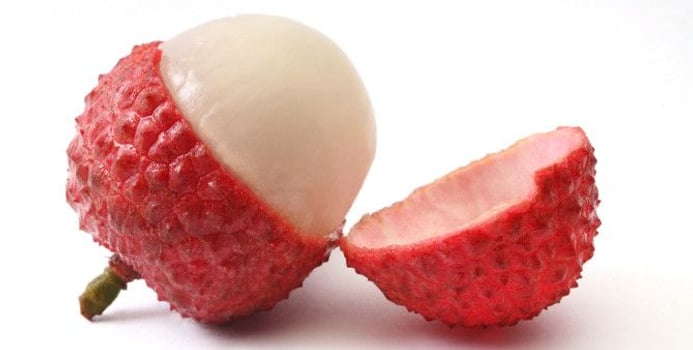Lychee is a juicy tropical fruit that originates in southern China. It is also grown in many Southeast Asian countries and elsewhere in the world. The outer cover of the fruit consists of a rough, pink colored rind. The inside has white, succulent flesh with a sweet and tangy flavor. A single glossy brown seed is found inside the pulp. The fruit is a rich source of vitamin C and B-complex vitamins. It is rich in potassium, phosphorous, magnesium and calcium. It also contains manganese, copper, zinc, iron and selenium. The fruit is a good source of dietary fiber.
B-Complex Vitamins
Not many fruits contain the B vitamins. However, a 100 gram serving of lychee provides various B vitamins. It supplies 1 percent of the recommended daily value of thiamin and 3.5 percent of both niacin and folates. Almost all functions in the body are enabled by the B vitamins. These vitamins play a vital role in the metabolism of protein, fats and carbohydrates. Inadequate B vitamins hinder energy production and result in lethargy and fatigue. Anxiety and depression are also associated with inadequate B vitamin intakes. The vitamins sustain a healthy nervous system as well as brain functions. They also help in the rejuvenation of skin, hair and nails.
Vitamin C
The fruit is a rich source of vitamin C. It contains 40 percent more vitamin C than orange juice. A 100 gram serving provides about 70 mg, or 117 percent of the recommended daily value. Foods rich in vitamin C help to boost the body's immunity. They help the body to develop a higher resistance to infections. Vitamin C helps the body to fight diseases and cancer more effectively. It helps in the repair of damaged tissues and helps to heal mucous membranes. The vitamin also helps to sustain healthy skin. Regular consumption of lychee fruit can prevent frequent colds, flu and sore throat. It also helps to relieve pain and inflammation.
Potassium
This mineral is a vital component of cells and body fluids. It helps to maintain healthy cells, normalize heart rhythm and stabilize heart pressure. It also helps to prevent blood clots. This supports cardiovascular health and reduces the risk of stroke and coronary diseases. The mineral also helps to keep other organs in the body in good condition. Potassium helps to sustain proper metabolism and muscular strength. Inadequate potassium can cause fatigue and muscular weakness.
Dietary Fiber
Lychee is a good source of dietary fiber. A 100 gram serving provides 1.4 grams of fiber, or 3.5 percent of the recommended daily value. This makes the fruit an excellent aid for proper digestion. Dietary fiber helps to prevent constipation and piles. It helps to clear the digestive tract of harmful toxins. This reduces the exposure period of healthy cells to carcinogens. It helps to reduce the risk of certain cancers, such as colon cancer. The high water content of the fruit also facilitates proper digestion. The fruit is a natural diuretic. When eaten several times in the week, it relieves pain caused by kidney stones.



